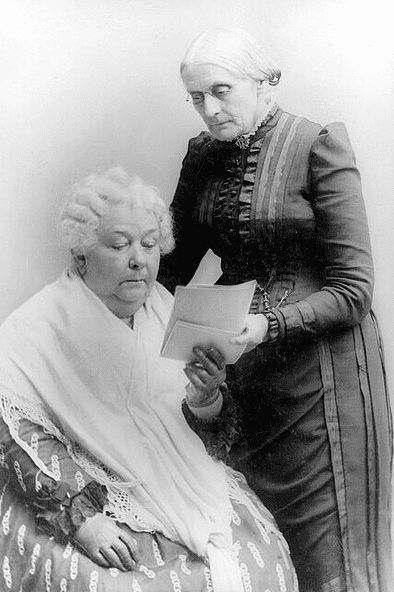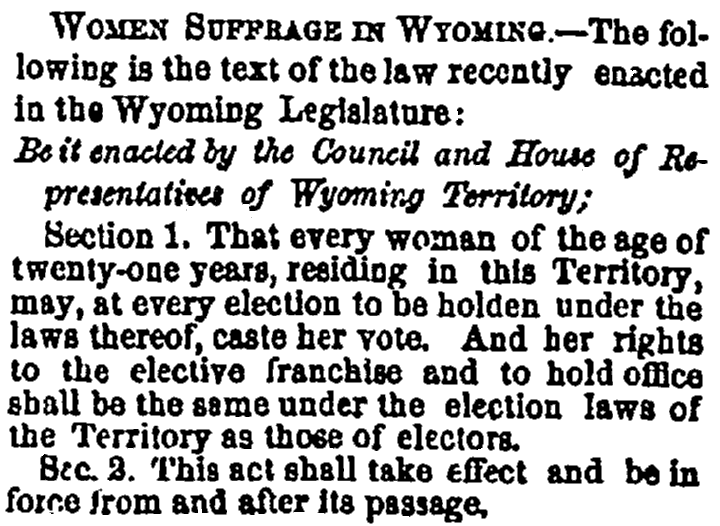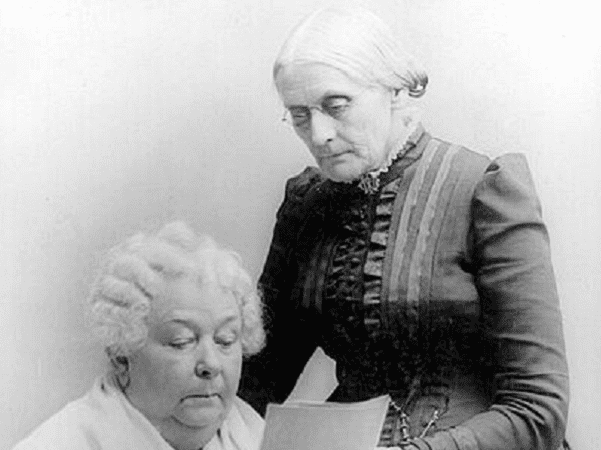Introduction: In this article, Gena Philibert-Ortega searches old newspapers to learn more about the ratification of the 19th Amendment on 18 August 1920, which guaranteed women the right to vote. Gena is a genealogist and author of the book “From the Family Kitchen.”
What historical event impacted nearly all American women in August 1920? It might be hard to believe, but less than 100 years ago, the ratification of the 19th Amendment – guaranteeing women the right to vote – occurred on 18 August 1920.

The 19th Amendment addressed women’s federal right to vote. It’s important to remember that depending on where she lived, a woman may have had some voting rights prior to 1920. In fact, in one state, women had the right to vote, temporarily, in the 1700s. The early constitution of New Jersey did not limit the right to vote by gender, so single women who owned property were able to vote in 1776. Voters in that constitution were defined as “adult inhabitants worth fifty pounds who resided in the state for one year.” But of course, female suffrage in New Jersey didn’t last long. In 1807 the constitution was reinterpreted to define a voter as an adult white male citizen who paid taxes.
Another early grantor of women’s voting rights was Wyoming. In 1869 Wyoming Territory was the first to grant female suffrage, which is reflected in its nickname, the “Equality State.”

Utah women could vote in 1870 but that right was revoked in 1887 because of the practice of polygamy, and then later reinstated. In my home state of California, female suffrage was granted in 1911 and it’s in those early voting registers that I find my paternal great-great-grandmother registered to vote.
The fight for suffrage was a long and arduous one, and started with early abolitionists/suffragists with familiar names like Elizabeth Cady Stanton and Susan B. Anthony, but over time new leaders in the movement emerged including Alice Paul and Carrie Chapman Catt. After more than 100 years of fighting for the right. After a war where women stepped up to the plate and worked at jobs previously only worked by men who had denied them rights. After women had been imprisoned and force-fed for protesting that they deserved the right to vote – that right was not a given even as states were debating the ratification of the 19th Amendment.
Ratifying the 19th Amendment
After a long fight, the support for an amendment granting women suffrage started growing. President Woodrow Wilson, whose White House had been picketed by suffragists, finally agreed to an amendment. The House of Representatives and the Senate passed an amendment stating “The right of citizens of the United States to vote shall not be denied or abridged by the United States or by any State on account of sex” within two weeks of each other in the Spring of 1919.
Next, the states needed to ratify the amendment. After one year, 35 states had ratified it, but there was one more state needed for the 19th Amendment to become law. Seven states (Alabama, Georgia, Louisiana, Maryland, Mississippi, South Carolina and Virginia) had already rejected it, and Tennessee was deadlocked over ratifying the passage of the amendment.*
Suffragists and anti-suffragists had descended on Tennessee as it debated female suffrage. The mother of a young 24-year-old East Tennessee representative had the foresight to slip her anti-suffrage son a note that made all of the difference. Phoebe Ensminger Burn’s note read:
“Hurrah, and vote for suffrage! Don’t keep them in doubt. I notice some of the speeches against. They were bitter. I have been watching to see how you stood, but have not noticed anything yet… be a good boy and help Mrs. Catt [referring to suffragist Carrie Chapman Catt] put the ‘rat’ in ratification.”**
Harry Burn heeded his mother’s words and voted in the affirmative, ensuring that Tennessee would be the 36th state to ratify the 19th Amendment. His historic vote made the young Republican a hero to some. One newspaper article included praise from his mother, reporting that she always knew he would do something big for his country because at the tender age of 19 months he knew the name of his town, county, state and district. Of his tie-breaking decision, he told newspapers:
“I am happy simply because I followed my conscience. It kept telling me ‘women are people and this is a government by the people.’”
The above Cincinnati Post article was accompanied by a picture of the influential mother and her legislator son.
The ratifying of the 19th Amendment was a joyful relief for many. Carrie Chapman Catt suggested a celebration across the nation, and the newspaper account below verifies that there were cities that followed suit. For example, Macon, Georgia, planned a noon celebration that involved five minutes of railroad and manufacturing whistles blowing, and the ringing of church bells. The mayor, Glen Toole, even issued a proclamation that stated:
“Whereas, a sufficient number of States have ratified the Constitutional Amendment bestowing upon the fair sex suffrage and,
Whereas, it is fitting that we pay homage to those women we so much admire and could not live without,
Now Therefore, I, as Mayor of the City of Macon, call upon the Ministerial Union to have the church bells ring at 12 o’clock, noon Saturday, August 21. I also call upon the railroads and manufacturing industries to have their whistles blown at the same hour in honor of the event, which they have worked so hard to accomplish.”
The passage of the 19th Amendment meant that women nationwide could vote in elections. However, the acceptance of female suffrage was not entirely over. Not all states ratified the 19th Amendment in 1920, and in fact a few states didn’t get around to it until later in the 20th century – the last being Mississippi, who finally ratified the 19th Amendment in 1984!***
Your Female Ancestors and Suffrage
Who was your first female ancestor to vote? Did you know a grandmother or great-grandmother that is counted as one of the first women voters in the family? Have you documented her story? I’d love to hear about her in the comments section below.
Note: An online collection of newspapers, such as GenealogyBank’s Historical Newspaper Archives, is not only a great way to learn about the lives of your ancestors – the old newspaper articles also help you understand American history and the times your ancestors lived in, and the news they talked about and read in their local papers. Did any of your ancestors help to pass the 19th Amendment? Please share your stories with us in the comments section.
————————–
* “19th Amendment,” History (http://www.history.com/topics/womens-history/19th-amendment: accessed 13 August 2017).
** “The Mother Who Saved Suffrage: Ratifying the 19th amendment,” History (http://www.history.com/news/the-mother-who-saved-suffrage-passing-the-19th-amendment: accessed 13 August 2017).
*** “19 Facts about the 19th Amendment,” Mental Floss (http://mentalfloss.com/article/67422/19-facts-about-19th-amendment: accessed 13 August 2017).
